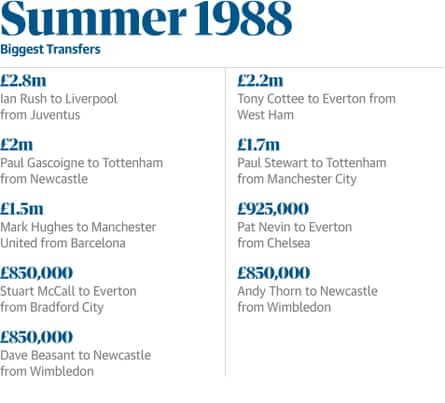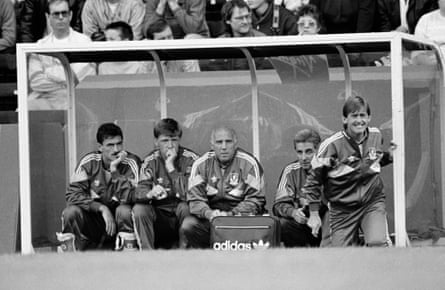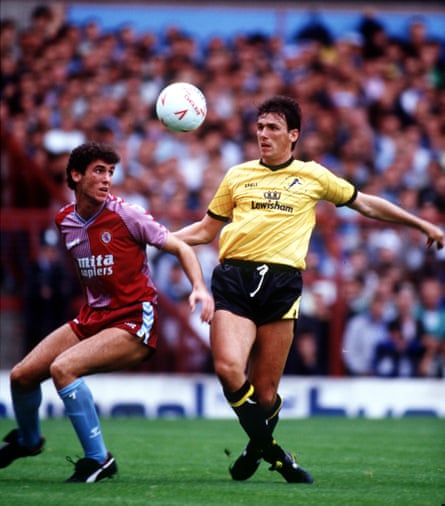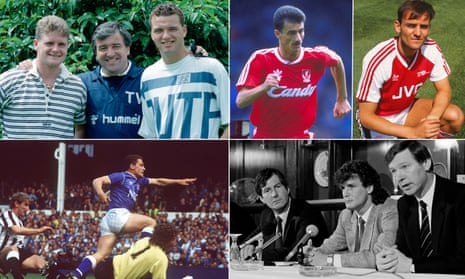English football was on its knees in the late 1970s and early 1980s as hooliganism and crumbling stadia led to a steady decline in attendances. Rock bottom arrived in 1985 in the shape of the Bradford fire and Heysel stadium disaster. Football spent the rest of the decade taking a long look at itself and, gradually, it started to get its house in order. As the sport’s reputation improved, so did TV revenue, with domestic rights more than doubling from £5.2m in 1983 to £11m in 1988.
On the back of this new TV deal, some clubs chose to spend big in the summer of 1988. Tottenham invested £1.7m on Paul Stewart and broke the British transfer record by spending £2m on Paul Gascoigne. Everton pushed the record up to £2.2m when they brought in Tony Cottee from West Ham; they also signed Stuart McCall for £850,000 and Pat Nevin for £925,000. Not to be outdone by their local rivals, Liverpool paid a whopping £2.8m to bring Ian Rush back from Juventus. George Graham went about his business quietly at Arsenal, only adding Steve Bould to his squad for a bargain price of £390,000.

Where to begin on 27 August 1988? We might as well start at the game that didn’t happen. Tottenham had invested heavily in their squad over the summer but their opening match against Coventry was postponed as they did not have a safety certificate for the East Stand at White Hart Lane. It was an embarrassing start to what had been an uneasy summer for Terry Venables. Losing 4-0 to Arsenal in the pre-season Makita tournament at Wembley was worrying enough, but the opening day debacle did not paint the club in a very positive light.
Arsenal, on the other hand, hit the ground running. Despite going behind at Plough Lane, goals from Brian Marwood, Paul Merson and Alan Smith helped them tear Wimbledon apart in an impressive 5-1 victory. Smith’s hat-trick was a sign of things to come. The eventual golden boot winner was honest enough to pay a big thanks to Marwood, who would provide his ammunition throughout the season. Marwood, signed for just £800,000 in March before the decadent summer spending began, was to prove a real bargain.
Rush’s return to Liverpool meant Kenny Dalglish now had a “wonderful selection headache”. This point was emphasised on the opening day, when John Aldridge scored a hat-trick against Charlton at Selhurst Park. With Rush only managing to make the bench, and players such as Alan Hansen, Steve McMahon, Ray Houghton, John Barnes and Peter Beardsley also added to the mix, their status as overwhelming title favourites was understandable.

Manchester United were not expected to challenge. The start of their 1988-89 campaign – a dire 0-0 draw at home to QPR – was another example of United’s early struggles under Alex Ferguson. Even Mark Hughes, who returned from Barcelona in a £1.5m transfer, could not provide the spark they needed that day. “United they stand at their lowest ebb,” declared the headline in the Express, where James Lawton added: “United and their manager Alex Ferguson do have time. Conservatively speaking, I would say until Christmas. If that sounds callous, well, the truth often is.” They would finish 11th in the league, lose 5-1 away at Manchester City in September 1989 and persist with Ferguson until the famous FA Cup run of 1990. It is impossible to think he would have survived that long in this era.
Everton’s forays into the transfer market looked to be paying dividends instantly. with a 4-0 thrashing of Newcastle at Goodison Park, where record signing Cottee scored the third hat-trick of the opening day. Cottee took only 34 seconds to get off the mark and was so delighted that he set himself a 30-goal target for the season.
Alas, for both Cottee and Everton, their performance against a poor Newcastle team (who would only win seven league games) was as good as it got. Cottee ended the campaign with 13 league goals. With Peter Reid joining QPR in February, Gary Stevens already at Rangers and Trevor Steven following him at the end of the season, Everton’s excellent side of the mid-1980s was slowly breaking up.
Newly promoted Aston Villa and Millwall shared a 2-2 draw at Villa Park, Millwall’s first game in the top flight. The main talking point was the 100th league goal of Tony Cascarino’s career and his continuing rise to the top. “If I get 20 goals this season that would be incredible but that’s the kind of standard I’m in now,” he said.

Like Cottee, Cascarino would end the season with 13 league goals, but this was an impressive return for a striker in his first season among the big boys. In fact, Millwall would remain unbeaten in the league until 29 October, even topping the table briefly on their way to an admirable 10th-place finish.
Norwich City also punched above their weight. Despite losing centre-forward Kevin Drinkell to Rangers (there’s a pattern developing here), Dave Stringer had built a team where the whole was definitely greater than the sum of its parts. Their 2-1 victory against Nottingham Forest – who would finish third in the league, reach the semi-finals of the FA Cup and win the League Cup – provided Norwich with the ideal start to the season, the new little-and-large striking duo of Robert Fleck and Robert Rosario gelling well.
Newcastle were not the only side to lose 4-0 on the opening day. West Ham’s abysmal defeat to Southampton at The Dell set the tone for their turbulent season. New £600,000 signing David Kelly looked lost; whereas Paul Rideout, who was making his Southampton debut after leaving Bari, scored a brace. A young man named Matthew le Tissier also scored after a mazy dribble. We would hear quite a bit about him in the future.
Elsewhere, Sheffield Wednesday beat Luton 1-0 with a goal from emergency striker Mel Sterland (another player who would end up at Rangers before the end of the season) and Derby started the campaign with a 1-0 victory against newly promoted Middlesbrough at the Baseball Ground. Derby would enjoy a fine season, finishing fifth and completing the double over champions Arsenal. Middlesbrough, however, did not survive, going on on the final Saturday of the season.

Something felt different about English football at the start of 1988-89 season. Clubs spent vast amounts in the summer and from October onwards many of us were exposed to regular live football for the first time. That season feels like the beginning of the game we see today. Whether that is a good thing or not is open to debate.
Sadly, it took the horrific events at Hillsborough to improve conditions for fans attending matches. From this point on, things simply had to change. The 1988-89 season really was a significant landmark in the British game. When Italia 90 proved an unexpected success, the sport was about to change forever.

Comments (…)
Sign in or create your Guardian account to join the discussion